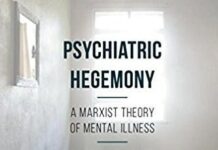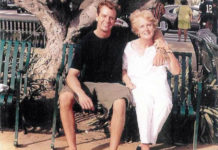After Seroquel
The topic of this article is Seroquel withdrawal: the process of withdrawal and the consequences of having taken this particular chemical for over ten...
“Virtual Autism” May Explain Explosive Rise in ASD Diagnoses
New clinical case studies have found that many young children who spend too much screen time—on TV’s, video games, tablets and computers—have symptoms labeled as “autism.” When parents take away the screens for a few months the child’s symptoms disappear.
Soldiers as Guinea Pigs: the Case of Mefloquine and Tafenoquine
Hundreds of Australian veterans have been diagnosed with serious neurological and psychiatric disorders, often mistaken for post-traumatic stress disorder, as a result of mefloquine, a neurotoxicant able to cause a “lasting or permanent” brain injury, and the experimental drug tafenoquine[.] Many maintain they were compelled to participate in trials of the drugs.
Psychiatric Hegemony: A Marxist Theory of Mental Illness
In Psychiatric Hegemony: A Marxist Theory of Mental Illness, Bruce Cohen explains the expanding power and influence of psychiatry in terms of its usefulness to the capitalist system — the more useful it is, the more power it is given, and the greater its power, the more useful it becomes.
I Don’t Believe in Autism
The conversation about what truly constitutes “autism” is an ongoing one. Although I resist the label personally, I do not begrudge anyone for identifying as autistic, or seeking out an autism diagnosis. Leaving this discussion within the domain of medicine is limiting. That’s why a new discourse is emerging, not among doctors, but among activists who push for autistic self-advocacy.
The Unforeseen Relationship: Psychiatric Medication and Spirituality
In 2015 I completed a qualitative research study exploring the interrelationship between psychiatric medication and spirituality. The key finding was that people were engaging spiritually with their prescriptions in ways that significantly impacted the course and outcome of recovery.
Electroshocking Children: Why It Should Be Stopped
In a recent commentary, University of Toronto historian Edward Shorter laments the efforts of people like myself in states like Texas who have successfully put limits on shocking children in order to induce grand mal convulsions. His argument is that we who have fought against this are denying children a benevolent medical treatment. In order to understand why Shorter’s plea to use electroshock on children is so egregious, we need to know what it does to children’s brains, which means a look at the science.
The Downfall of Peer Support: Are You Kidding Me?
In April of this year, Sera Davidow authored a blog titled “The Downfall of Peer Support: MHA & National Certification.” I do not agree with much of what she says in her blog, and as the vice president of Peer Advocacy, Supports and Services at Mental Health America I'd like to respond.
Tranquilizing Humanity into Oblivion: A Warning from Nathan S. Kline
Widely heralded as the father of American psychopharmacology, Kline insisted that his discoveries were adjunctive to psychotherapy, not replacements. The psychopharmacology of Kline's era recognized that medications are a blunt instrument.
My Story of Benzo Withdrawal and Activism
My story starts in 1976. I had a nervous breakdown whilst studying for my Accountancy Technician examination. I was then prescribed a series of benzodiazepine/anti depressant drugs for 5 years. I have been campaigning for the last 28 years at local, national and international level on this public health scandal and government cover-up. The following questions need to be asked to those responsible: Why have the doctors and psychiatrists ignored the 1988 Committee on Safety of Medicines Guidelines on the prescribing of benzodiazepines? Why are the same physicians making the same mistakes with the newer drugs?
Brain Disease or Existential Crisis?
As the schizophrenia/psychosis recovery research continues to emerge, we discover increasing evidence that psychosis is not caused by a disease of the brain, but...
Hegemonic Sanity and Suicide
The “good” suicide attempt survivor wakes up in a hospital bed bathed in beautiful natural light, surrounded by the people who love them most, and they realize that their thinking was flawed and all those unsolvable problems can actually be solved if they are just compliant with medication and therapy. And then there's the “bad” suicide attempter who is angry that they lived, who challenges the status quo.
Flibanserin: The Female Viagra is a Failed Me-too Antidepressant
Since a Food and Drug Administration (FDA) advisory committee, on June 4, recommended approval of flibanserin (AddyiTM) in June, there have been numerous editorials and news stories about the controversies surrounding the first “pink Viagra” to hit the market. We have sought to understand the process and financial incentives that led the advisory committee to recommend its approval, with Sprout Pharmaceuticals prepared to market it as a treatment for a new disorder in DSM 5: Female sexual interest/arousal disorder.
Inpatient Hospitalization: An Inside Perspective
When someone is in severe crisis due to feeling emotionally overwhelmed, one of the main access points for care is an inpatient hospital setting. Though many disparage the hospital setting, there are few alternatives to this setting during an acute mental and emotional crisis. At the same time, there are a number of barriers to individuals getting optimal care. I will try to examine some of these barriers and some of the main critiques of hospitalization. In a perfect world, those experiencing severe emotional crisis would be able to find true sanctuary; a place for rest and healing. With enough time, nourishment and self-care, people experiencing severe emotional distress can and do get better.
Holistic Recovery From Schizophrenia: A Mother and Son’s Journey
I am a mother of a son who was given a diagnosis of schizophrenia in December 2003, a son who is doing well today...
Voices in our Heads: The Prefrontal Cortex as Parasite
As I considered the voice I heard talking to me in my own head, it occurred to me that what was happening was, more or less, a later development of the brain talking to a more basic and earlier level of consciousness, one which was not verbal itself and was, in fact, the actual seat and locus of my real awareness.
Adam Maier-Clayton: Assisted Suicide and Mental Illness
If we describe “death with dignity” as a benefit, a good thing, a release and relief and a mercy for people with chronic unbearable and unmanageable pain, why do we also describe exclusions from assisted suicide for people with mental illness as a protection rather than discrimination?
“Prisons Without Bars” – Forced Institutionalization of People with Disabilities
In the wake of deinstitutionalization, we no longer have the vast asylum system we once did. Instead, something more insidious has taken root — for-profit institutions that call themselves neurorehabilitation centers, group homes, and other official-sounding names.
Stop The War On Chronic Pain Patients
Much has been written lately about an "epidemic" of opioid overdose deaths, in some cases advocating for a blanket reduction in the availability of prescription opioids. Regrettably, many readers will not penetrate beneath the sensational headlines to grapple with the complicated realities of this issue. Few who aren't themselves in pain may realize what harm such articles are doing to tens of millions of people.
How Canada’s Prisons Killed Ashley Smith: A National Crime and Shame
Ashley Smith was a very troubled and rebellious teenager. By the time she was 13, she was getting into trouble in school. On one occasion, Ashley was charged with the crime - actually a childish prank - of “throwing crabapples at a postal worker.” Ashley was convicted and sentenced to detention in New Brunswick Youth Centre. Prison psychologists and psychiatrists labeled her defiant behavior a “mental health issue”; a thinly disguised term for “mental illness.” There is no record of any detention or prison staff or health professional trying to understand Ashley’s resistance to authority as youth rebellion.
It’s NOT all in Your Head
Over 100 million people in the US suffer from chronic pain – defined as pain lasting longer than 12 weeks. Up to 80% of those sufferers are women, many of whom report having been repeatedly brushed off or referred out by medical doctors who could find no discrete medical cause for the symptoms they reported. Some patients report an even harsher finding by their doctors: “To the best of my ability to determine, your pain is not medical in origin. I believe you need to be evaluated by a psychiatrist or psychologist who is qualified in psychosomatic issues.”
Ensuring Integrity of Studies: Analysis of the Dan Markingson Case
Dan Markingson was a 26-year-old mentally ill young man who violently killed himself in 2004 while enrolled in a drug-sponsored study of atypical antipsychotics among persons experiencing psychosis for the first time. Highly vulnerable individuals like Markingson should not be taken advantage of in the name of scientific research, and inability to protect such vulnerable subjects compromises the integrity of research.
Hearing Voices: Where We Locate Them Shapes Our Experience
My experience began when I heard two people talking about me when I was home alone. I needed a reasonable explanation, and concluded that it had to be my upstairs neighbors. Then I began to hear the voices outside of my apartment — this new presentation meant that my explanation no longer made sense.
Deadly Medicines and Organised Crime: How Big Pharma Has Corrupted Health Care
In 2012, I found out that the ten biggest drug companies in the world commit repeated and serious crimes to such a degree that they fulfill the criteria for organised crime under US law. I also found out how huge the consequences of the crimes are. They involve colossal thefts of public monies and they contribute substantially to the fact that our drugs are the third leading cause of death after heart disease and cancer.
Don’t Harm Them Twice: When the Language Surrounding Benzodiazepines Adds Insult to Injury (Part...
Language is important. And when language dictates specific treatment protocols, it should be used with extreme scrutiny. Using the wrong words can put vulnerable people at risk—not only to their sense of self-worth, their sense of self-knowledge, and they way they are treated, but also to their health.






















